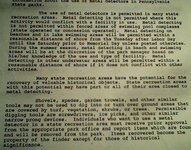wainzoid
Bronze Member
State Parks, SGL's, Army Corp, and elsewhere
Is there any laws to keep you from hunting the State Parks, locally I'm thinking of Shawnee, Trough Creek, Canoe Creek, Prince Gallitzin, ect.
Whats the rule on SGL's or PFBC land.
How about Army Corp ground....like lake Raystown?
What about campuses like Altoona PSU, Saint Francis, UPJ, ect...?
Locally there are no ordinances against hunting any of the parks, schools, ball fields ect.... But I wasnt sure about the other places a little farther up the road
Is there any laws to keep you from hunting the State Parks, locally I'm thinking of Shawnee, Trough Creek, Canoe Creek, Prince Gallitzin, ect.
Whats the rule on SGL's or PFBC land.
How about Army Corp ground....like lake Raystown?
What about campuses like Altoona PSU, Saint Francis, UPJ, ect...?
Locally there are no ordinances against hunting any of the parks, schools, ball fields ect.... But I wasnt sure about the other places a little farther up the road









